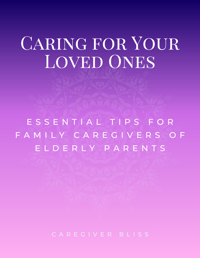Signs of Alzheimer's in Elderly Loved Ones

As our loved ones grow older, it's natural to be concerned about their health and well-being. One condition that many older adults face is Alzheimer's disease. This article will help you understand what Alzheimer's disease is, its signs and symptoms, and what you can do to support your elderly loved one if you suspect they may have it.
What is Alzheimer's Disease?
Alzheimer's disease is a type of dementia, which is a group of brain disorders that affect memory, thinking, and behavior. Alzheimer's is the most common form of dementia, accounting for around 60-80% of all cases. It mainly impacts older individuals, typically those aged 65 and older.
Signs and Symptoms:
- Memory Loss: One of the earliest signs of Alzheimer's is forgetting recently learned information. Your loved one might ask the same questions repeatedly or struggle to remember important dates or events.
- Difficulty Solving Problems: Alzheimer's can make it hard for your loved one to solve simple problems or plan everyday tasks. They might struggle with things like managing finances or following a recipe.
- Confusion with Time and Place: People with Alzheimer's might lose track of dates, seasons, or the passage of time. They could also forget where they are or how they got there.
- Trouble Completing Familiar Tasks: Simple tasks that were once routine, like dressing or bathing, might become challenging for someone with Alzheimer's.
- Language Problems: People with Alzheimer's often have trouble following or joining a conversation. They might stop in the middle of a sentence and not know how to continue.
- Misplacing Items: Your loved one might put things in unusual places and then struggle to retrace their steps to find them again.
- Changes in Mood and Personality: Alzheimer's can cause changes in a person's mood or personality. They might become confused, suspicious, depressed, fearful, or anxious.
What to Do:
If you notice these signs in your elderly loved one, it's essential to take action:
- Talk Openly: Have an open and honest conversation with your loved one about your concerns. They might not be aware of the changes happening to them.
- Consult a Doctor: A healthcare professional can perform tests and assessments to determine if Alzheimer's is the cause of the symptoms. The earlier the diagnosis, the better the chances of managing the condition.
- Offer Support: If your loved one is diagnosed with Alzheimer's, offer your support and reassure them that you'll be there throughout the journey.
- Plan for the Future: Work together to create a plan for their care as the disease progresses. This might involve making legal and financial arrangements and discussing their preferences for care.
- Stay Informed: Educate yourself about Alzheimer's disease, its progression, and available treatments. This knowledge will help you provide better care and support.
Conclusion:
Alzheimer's disease can be a challenging diagnosis, both for the individual experiencing it and their family. By recognizing the signs and symptoms early, you can take the necessary steps to ensure your loved one receives the care and support they need. Remember that you're not alone on this journey – there are resources, healthcare professionals, and support groups available to help guide you through this process.
Have you or someone you know experienced the signs of Alzheimer's in an elderly loved one? Sharing your stories, insights, and questions can create a supportive community. Let's come together to learn from each other and provide valuable assistance during these challenging times. Leave a comment below to join the conversation!
Alzheimer’s Disease Resource Page
Delve into the realm of Alzheimer's Disease resources, gaining a deeper understanding of the benefits, considerations, and choices available. Explore our comprehensive Alzheimer's Disease Resource Page for valuable insights, practical tips, and expert guidance on navigating the challenges associated with Alzheimer's, bridging the gap between independent living and specialized care facilities.
Free Guide:
Caring For Your Loved Ones
 Attention family caregivers! Are you struggling to provide the best care for your aging parents? Don't worry, we've got you covered.
Attention family caregivers! Are you struggling to provide the best care for your aging parents? Don't worry, we've got you covered.
Download our free guide, Caring for Your Loved Ones: 10 Essential Tips for Family Caregivers of Elderly Parents, and unlock the secrets to becoming an exceptional caregiver.
From adapting the home environment to promoting independence, this invaluable resource will transform your caregiving experience into a more rewarding journey. Don't wait—give your loved ones the care they deserve, and download your free copy today!
